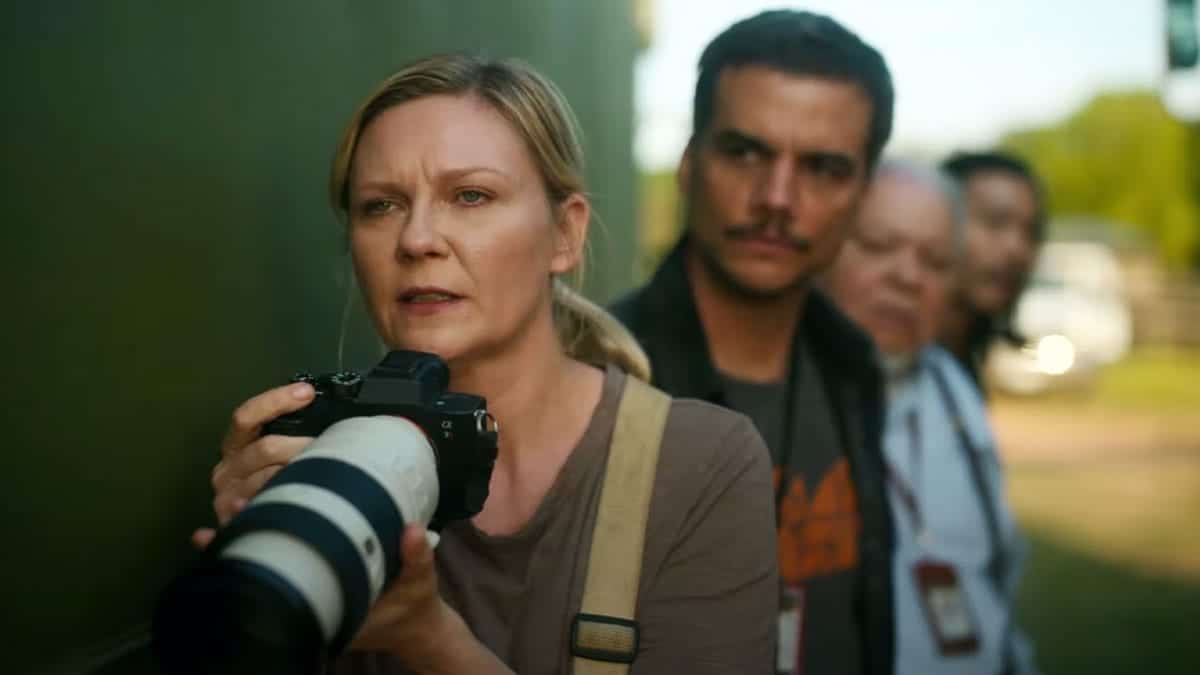




Dir/Wri: Alex Garland | Cast: Nick Offerman, Kirsten Dunst, Wagner Moura, Jesse Plemons, Jefferson White, Cailee Spaeny | US Drama 109′
Civil War provides UK filmmaker Alex Garland with an expanded American canvas on which to explore themes and ideas of his four earlier, more intimate, British films. This new UK/USA co-production follows the journey of a quartet of media journalists racing against time in a 4-wheel vehicle as they travel from New York through Pennsylvania onto Washington DC to record a make-or-break address to the nation by a beleaguered President of the USA. The journey itself is no joy ride as the American landscape has been ripped apart by warring communities that has paralysed the White House at the heart of American politics.
In one chilling sequence, the journalists remind a menacing ginger henchman with red glasses (played by Jesse Plemons) that ‘We’re Americans, ok?’ to which they get the reply ‘What kind of American are you?’. In another scene, Kirsten Dunst, as a world-weary war photographer journalist (named after Lee Miller the WW2 war photographer), has become the reluctant mentor for a young woman (Cailee Spaeny) who is hungry for experience without comprehending how bloody and awful is the reality of war. The older war photographer mentions she has covered the horrors of war thinking that this would be a warning to others not do so again, although she knows now that this is not the case.
In another of the most tender and telling scenes in the film, the photographer agonises over the decision to delete or retain what may be a beautiful image but also one which may exploit the death of a man she has befriended. It is in scenes like this that Garland raises moral dilemmas between what the human eye can see and the camera lens records that is at the heart of photography and the subject of Haskell Wexler’s 1968 film Medium Cool. The film also suggests the spectre of Susan Sontag’s devastating essay Regarding the Pain of Others (2003). It is within the skill of Garland’s writing that themes questioning politics, media and society can be found beneath the surface of a film fundamentally built on images linked to a physically fast flowing narrative.
Garland is added by a production team from earlier films and Rob Hardy’s use of a new small light camera (DJI Ronin 4d) is able to keep the action stable when viewed on both IMAX and smaller screens. Fast-moving action sequences benefit from off-screen input of an experienced ex-Navy Seal adding authenticity to the film’s vivid sense of physical movement with Glenn Fremantle’s soundtrack combining lush chords of stereophonic music with soundscapes. The performances are skilful and reveal the director’s sensitive understanding of women in largely maledefined environments. Kirsten Dunst brings depth to the role of the mature photographer/journalist just as much Garland centred earlier films around female characters with the sensitive performances of Alicia Vikander in Ex Machina, Natalie Portman in Annihilation, Sonoya Mizuno in Deus and Jessie Buckley in possibly his most personal and misunderstood film Men.
Civil War also fits very well alongside outsider filmmakers who have observed America at a not so cool distance and is comparable with American films made by Europeans such as Jacques Demy and Agnes Varda. The film that Civil War most echoes may well be the Italian director Antonioni and his daring and ground breaking critique of America in Zabriskie Point from 1969. Civil War contains similar cinema-verité images of protest between civilians /students and military police/guards suggesting that nothing much has changed since the revolution of 1968. The UK-based filmmaker also captures images of the decay of former glories of communities crystallised by beautiful images of a damaged circus clown model, neglected rural landscapes and characters who are framed or towered over by the glass and concrete of American architecture.
Just as Antonioni questioned the breakdown of society and consumerism in 1968 there is also rich and potent post COVID/ Capitol Hill riot material here for Garland in 2024 with both films involving a journey heading towards apocalyptic finales. Civil War tackles the meltdown and threat to order by the divisive behaviour of people that is accelerated by politicians and speculates on the current fear that America is drifting towards a kind of anocracy, existing somewhere between democracy and autocracy. If Garland’s earlier films derived from intimate, dystopian and out-of-body time zone experiences his latest could be viewed as the nightmare of what becomes of paradise as envisaged by the youthful ‘trippy hippy’ but now older protagonists of Garland’s breakthrough 1996 novel The Beach.
Civil War may have rough edges linked in places to the ambitious script, although it remains a remarkable contemporary outing revealing a sensitive director with the ability to harness vivid images of death and violence from acts of warfare. @PeterHerbert
https://www.peterherbert.online
https://theartsproject1.wixsite.com/theartsproject
CIVIL WAR on release from 12 April 2024 | PREMIER IMAX London on 19/3/24 with an introduction from Alex Garland